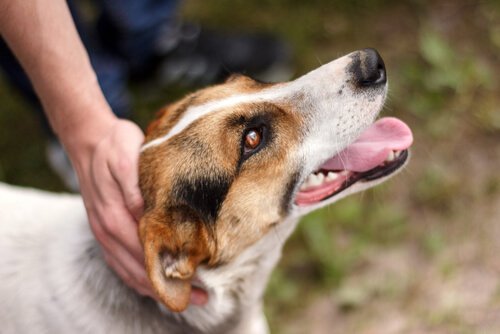Everything You Need to Know About Dog Fines
3 minutes


Written and verified by the lawyer Francisco María García
Published: 02 julio, 2018 13:39
Last update: 27 diciembre, 2022 17:07
Large cities around the world have different laws to enforce responsible pet ownership. In order to avoid having any inconveniences, you need to be well informed about fines related to dog ownership in Spain.
The reason for these fines
Fines are basically intended to penalize inappropriate behavior. This includes animal abuse, or acts that disturb the peace in cities. Rules are meant to promote coexistence between humans and pets. Likewise, you must make sure you keep your dog is well-behaved to prevent getting fined.
What are these fines?
Massive dog training campaigns took place and rules for dog owners became stricter in Spain since 2016. They are intended to promote city cleanliness and to raise awareness about the importance of being responsible pet owners.

In Madrid, your dog might get a fine during an everyday walk. That’s because owners who don’t pick up their pets’ feces are more likely to receive an expensive sanction. Sometimes, instead of having to pay a fine, you can do weekend community service, such as cleaning the streets and parks.
Anti-docking
Another important sanction is related to the prohibition of docking any animal body parts. Since 2012, the European Parliament came up with this pet protection initiative.
In 2015, the Spanish Congress approved a law that penalizes surgical operations for purely aesthetic purposes in all dog breeds.
Some communities, such as Aragon, Andalusia, Catalonia, Madrid, Valenciana, Murcia and Navarra had already set precedents. Also, these practices were already considered illegal in those places before Parliament’s approval.
Actions to take
- The approved proposal also requires governments to take action to prevent stray dogs from reproducing uncontrollably. Another law protects pets from abandonment, and regulates the use of animals in shows and advertisements.
-
Likewise, people who abandon their pets, and physically or mentally exploit them shall be fined. Owners who don’t provide proper care and hygiene to their pets can also be punished.
-
Anyone can anonymously denounce abuse to pets or strays. Authorities can fine or sentence to prison anyone caught abusing or humiliating animals.
-
Another positive result was the increase in public health campaigns for free sterilization of domestic animals. This took place in several Spanish cities.
-
Authorities can fine people who collect animals without permission on the streets of main Spanish cities. If you find an abandoned dog, it’s best to contact the authorities or animal shelters.
How to avoid fines
The first step is to understand that being a responsible pet owner doesn’t just mean taking care of your animal’s health. It’s important for a dog to be healthy in order to live among other animals and people. You must take your pet to the vet periodically, and be current on his vaccines and anti-parasitic treatments in order for him to be healthy.
You should also take necessary actions to prevent your dog from disturbing the peace of other people. A dog’s behavior and that of its owner must abide to the rules that considered to be acceptable and ethical within society.

Empathy
Be understanding to other people who don’t want or cannot live with animals, whether it being due to personal preference or for health related issues such as allergies, phobias and other diseases. These people should not feel forced into a dealing with any pet-related inconveniences.
That’s why it’s a good idea to have a well-behaved to prevent having any fines. If you are a good pet owner, then it’s possible to live peacefully and enjoy the company of your best friend without having it putting a hole in your pocket.
Main image source: M. Peinado
Large cities around the world have different laws to enforce responsible pet ownership. In order to avoid having any inconveniences, you need to be well informed about fines related to dog ownership in Spain.
The reason for these fines
Fines are basically intended to penalize inappropriate behavior. This includes animal abuse, or acts that disturb the peace in cities. Rules are meant to promote coexistence between humans and pets. Likewise, you must make sure you keep your dog is well-behaved to prevent getting fined.
What are these fines?
Massive dog training campaigns took place and rules for dog owners became stricter in Spain since 2016. They are intended to promote city cleanliness and to raise awareness about the importance of being responsible pet owners.

In Madrid, your dog might get a fine during an everyday walk. That’s because owners who don’t pick up their pets’ feces are more likely to receive an expensive sanction. Sometimes, instead of having to pay a fine, you can do weekend community service, such as cleaning the streets and parks.
Anti-docking
Another important sanction is related to the prohibition of docking any animal body parts. Since 2012, the European Parliament came up with this pet protection initiative.
In 2015, the Spanish Congress approved a law that penalizes surgical operations for purely aesthetic purposes in all dog breeds.
Some communities, such as Aragon, Andalusia, Catalonia, Madrid, Valenciana, Murcia and Navarra had already set precedents. Also, these practices were already considered illegal in those places before Parliament’s approval.
Actions to take
- The approved proposal also requires governments to take action to prevent stray dogs from reproducing uncontrollably. Another law protects pets from abandonment, and regulates the use of animals in shows and advertisements.
-
Likewise, people who abandon their pets, and physically or mentally exploit them shall be fined. Owners who don’t provide proper care and hygiene to their pets can also be punished.
-
Anyone can anonymously denounce abuse to pets or strays. Authorities can fine or sentence to prison anyone caught abusing or humiliating animals.
-
Another positive result was the increase in public health campaigns for free sterilization of domestic animals. This took place in several Spanish cities.
-
Authorities can fine people who collect animals without permission on the streets of main Spanish cities. If you find an abandoned dog, it’s best to contact the authorities or animal shelters.
How to avoid fines
The first step is to understand that being a responsible pet owner doesn’t just mean taking care of your animal’s health. It’s important for a dog to be healthy in order to live among other animals and people. You must take your pet to the vet periodically, and be current on his vaccines and anti-parasitic treatments in order for him to be healthy.
You should also take necessary actions to prevent your dog from disturbing the peace of other people. A dog’s behavior and that of its owner must abide to the rules that considered to be acceptable and ethical within society.

Empathy
Be understanding to other people who don’t want or cannot live with animals, whether it being due to personal preference or for health related issues such as allergies, phobias and other diseases. These people should not feel forced into a dealing with any pet-related inconveniences.
That’s why it’s a good idea to have a well-behaved to prevent having any fines. If you are a good pet owner, then it’s possible to live peacefully and enjoy the company of your best friend without having it putting a hole in your pocket.
Main image source: M. Peinado
This text is provided for informational purposes only and does not replace consultation with a professional. If in doubt, consult your specialist.








